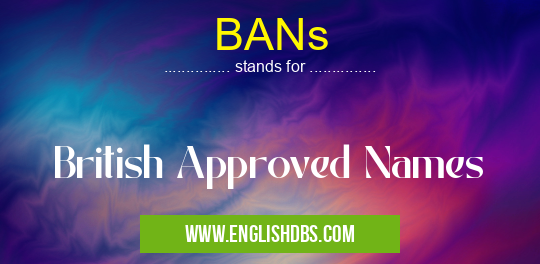What does BANS mean in PHARMACY
British Approved Names (BANs) are the accepted scientific names used in the United Kingdom for pharmaceutical substances. They are regulated by the Medicines and Healthcare products Regulatory Agency (MHRA). BANs are published by the British Pharmacopoeia Commission (BPC) and serve as a common nomenclature for medicines, so that any pharmacist or healthcare provider is able to accurately identify any pharmaceutical product they encounter. This helps to ensure the quality, safety, efficacy and consistency of medicines across the country.

BANs meaning in Pharmacy in Medical
BANs mostly used in an acronym Pharmacy in Category Medical that means British Approved Names
Shorthand: BANs,
Full Form: British Approved Names
For more information of "British Approved Names", see the section below.
Meaning of BANs
BANs stands for British Approved Names, which are approved scientific terms used to identify specific pharmaceutical substances in the UK. These names must be used by all pharmacists and healthcare providers when discussing or prescribing medicines. The names provide a common language to help ensure accuracy and quality when it comes to identifying drugs among different manufacturers or distributors. BANs also make sure that everyone involved in prescribing or providing medicines understands what substance is being discussed and prescribed. This is important for patient safety and effective treatment outcomes.
Function of BANs
The primary purpose of BANs is to promote a consistent language when discussing pharmaceutical products among prescribers, pharmacists, and healthcare professionals. This helps to ensure accuracy and quality when it comes to identifying drugs among different manufacturers or distributors. Another function of BANs is to provide a unique identifier for each active ingredient within a drug product, allowing prescribers and dispensers to verify their accuracy with less risk of confusion compared with non-standard nomenclatures such as generic names, brand names, chemical/generic names etc.. Moreover, by providing an established system with commonly recognized terms for medications helps expand communication beyond just one language barrier – making sure that all parties understand what drug has been prescribed.
Essential Questions and Answers on British Approved Names in "MEDICAL»PHARMACY"
What are BANs?
BANs are British Approved Names, which refer to the internationally accepted names of medicinal substances. These are used for prescribing, dispensing and other legal purposes.
Who establishes BANs?
The Medicines and Healthcare products Regulatory Agency (MHRA) is responsible for establishing BANs in the United Kingdom.
Where can I find a list of BANs?
The MHRA publishes an updated list of all approved BANs on their website. Additionally, this information can be found on most drug-related websites or from pharmacies.
Can I suggest an update to the BAN list?
Yes, members of the public can make suggestions about updating the list by contacting the MHRAs Committee on Safety of Medicines (CSM).
How long does it take for a new name to be approved as a BAN?
This process usually takes several months depending on how detailed your submission is. The MHRA will provide an update at each stage until it is finally approved as a BAN or rejected due to any safety concerns.
What happens if my suggestion is approved as a BAN?
Once approved, your suggested name will be officially registered as a British Approved Name and it will be published in the official MHRA list. It may also appear on some pharmacy labels.
Are there any restrictions for changing existing names on the BAN list?
Yes, any changes suggested must not conflict with existing names already registered in other jurisdictions or impede safe prescribing practices.
How do I know if my requested name has been accepted as a BAN?
The MHRA will notify you directly via email when your request has been accepted or rejected. You can also check their website regularly for updates to confirm whether your requested name has been accepted as a British Approved Name (BAN).
Are there restrictions around using non-BAN names when prescribing drugs?
Yes, any drugs prescribed outside of Britain must use recognised international chemical names which have been issued by the World Health Organisation (WHO). Using such names helps reduce confusion and ensure universal understanding amongst health care professionals globally.
Is there any penalty for using non-recognised drug names when prescribing medication?
Yes, it’s important to follow relevant regulations regarding drug nomenclature to ensure patient safety and accuracy of prescription writing; not following these rules could result in legal action being taken against healthcare professionals who fail to comply with relevant standards set out by various governing bodies such as the GMC or NMC in Britain.
Final Words:
In conclusion, British Approved Names (BANs) serve as an essential tool in promoting accurate identification of pharmaceutical substances throughout the United Kingdom’s healthcare system. By providing an internationally recognized set of names for medications approved by regulatory bodies such as MHRA, BPC & Coe it ensures standardization across pharmacy settings even if there are multiple names given in different languages associated with a particular medication e.g., generic name versus brand name in Spanish versus English etc.. Furthermore, drug information can easily be obtained from databases using these globally shared keywords within minutes while still maintaining accuracy and uniformity; ultimately reducing potential errors due to misidentification or misinterpretation of labels/data associated with medicinal items.
